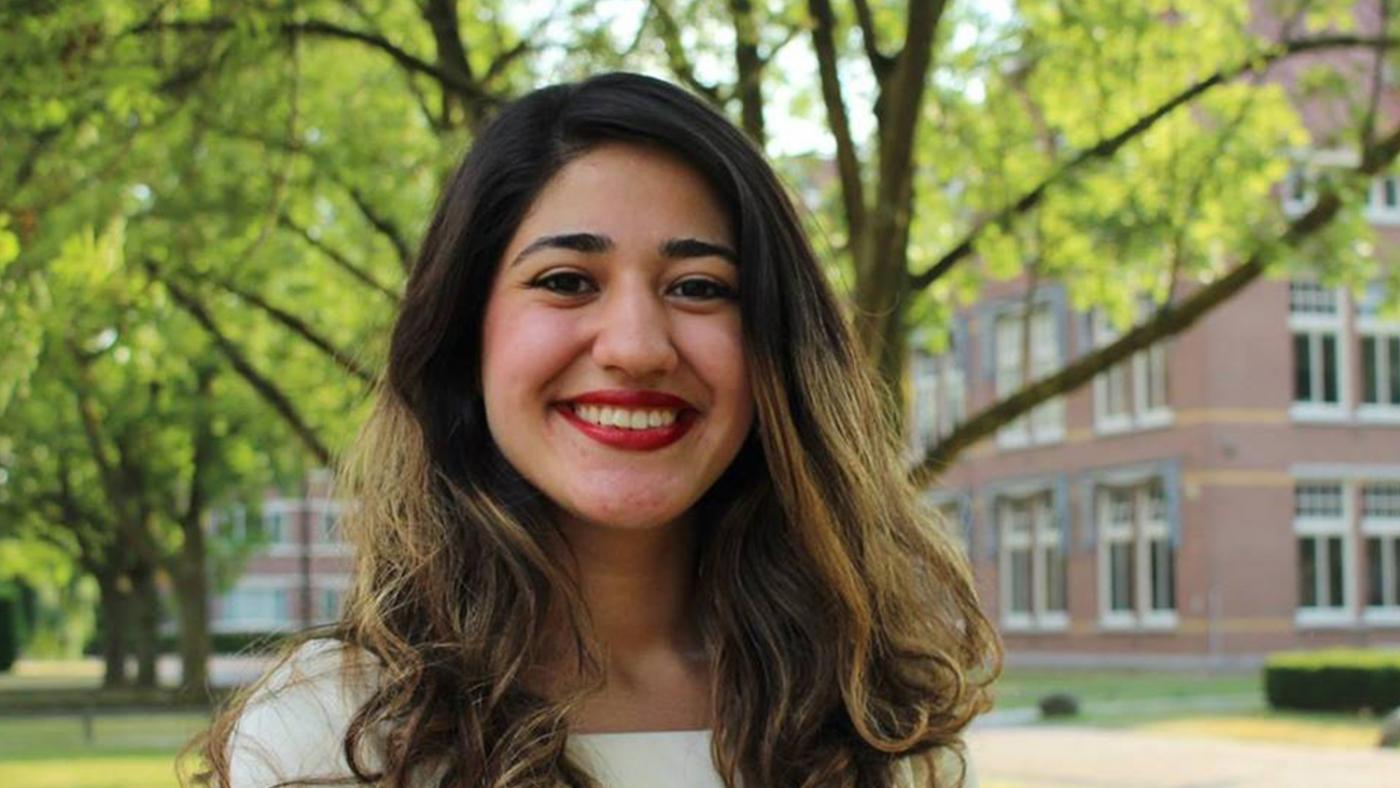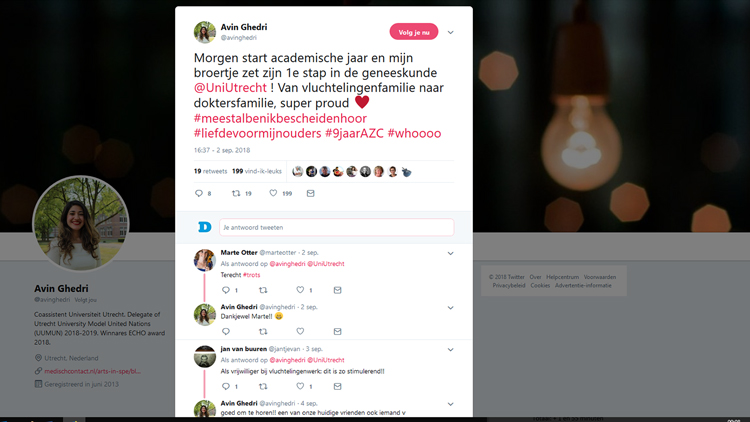Medical student Avin: ‘Refugees should grab opportunities the Netherlands offer’

On September 20th, she received the Echo Award, a national award meant to encourage excellent talented people in higher education with a non-western background.
The jury praised Master’s student of Medicine Avin (23) for turning her deep-seated anger into something positive. As a member of the UMC Utrecht work group Diversity & Inclusion, for example, she fights to change the medical world in such a way that people with a migrant background feel at home at the study programme and in the medical world itself. Furthermore, when she was a Bachelor’s student, she taught guest classes on the Middle East in high schools a few times a year. Once a year, she organises – among other things – a play day for children at the refugee centre. Avin feels it’s important to show refugee children there’s more to life than just the centre. “The Netherlands is a country of opportunities, and when you work hard, you can achieve a lot. But if you’re given opportunities, it’s up to you to grab them.”
Two weeks earlier, on September 2, 2018 to be exact, Avin tweeted the following: 
Plenty of material to ask Avin about – her life, her motivation. DUB meets with her at The Basket. With a cup of fresh mint tea, taking a short break from her residency at the hospital in Nieuwegein, the fifth-year student, who was born in Iraq, tells her story. She starts by recounting how her parents fled with their family, the fight to obtain a residence permit, the efforts her parents undertake in order to be able to work as doctors again in the Netherlands, and the desires of the three children to become doctors themselves after finishing their studies in Utrecht. “Our family has been through a lot, but I don’t feel like a victim. I gain energy from the things that happened to me; it’s given me my determination. The only thing I’m still angry about is the way we were treated by the IND. I’m still not at peace with that.”
Nine years in refugee centres
Avin is three years old when her parents decide to flee from Iraq to the Netherlands with their children. They find themselves in a situation that’s familiar for many refugees: they move from one refugee centre to another. Avin saw many of them in the nine years she spent in refugee centres. In the meantime, her parents try to obtain residence permits. It isn’t easy. Then, Avin hears politician Rita Verdonk (VVD) say on TV that some refugees don’t belong in the Netherlands. “At first, I became so sad, because I took that remark personally. I was a refugee, and I tried my best at school, had Dutch friends. Why wouldn’t I belong here? After the sadness came anger. How dared Verdonk say something like that? That anger pushed me to work very hard in school.”
In the meantime, the application for a residence permit was denied three times, and the family had to wait for a long time before the appeal could take place. Eventually, it did, and Avin’s mother was allowed to explain why she thought the family belonged in the Netherlands. “She argued her children belong in the Netherlands,” Avin says, who remembers the appeal as if it happened yesterday. “I was very young and it affected me, seeing my mother cry during her speech. Because for the first time, I realised there was a real chance that we’d be sent back. Before that, I’d never noticed it, because my parents had never let me see any of their insecurities about this, and were always full of hope with us.”
These two events fuelled her drive to chase her goals. Although she’d wanted to become a human rights lawyer when she was younger – as she’d had to deal with lawyers from a very young age – her wishes gradually changed to wanting to follow in her parents’ footsteps. “I always saw them study hard, reading their medical books, because they had to get their medical licenses again in the Netherlands. During their graduations and after a few show-and-tells in school about the human body, I realised I wanted to become a doctor.” Her older brother preceded her – and her younger brother followed the both of them. “Now we’re all studying medicine in Utrecht.”
Education
Avin’s parents fled from Iraq due to its unsafe political climate. “Despite all setbacks, they gave us a normal childhood. They never made me and my brothers feel like there was no hope left. My parents’ perseverance has greatly inspired me.” During the asylum procedure, which took nine years, Avin’s parents both did their residencies – something that’s not self-evident, because Avin’s parents were in their late thirties, early forties, and had to practically start from scratch before they were allowed to practice their old careers again. After they received their residence permits, they were allowed to work. They’ve both been working as general practitioners in Gelderland for several years now.
Avin’s education progresses smoothly thanks to her parents’ creativity and resourcefulness, she says. She gets to stay at a single elementary school despite the many moves that take the family to different refugee centres. Several Dutch people were very generous to the Ghedri family. “My parents made Dutch friends who became like family to us. They took us to museums, such as the Anne Frank house and Naturalis. But they also lent us their caravan so we could go on vacation to Slagharen. Politicians were saying we didn’t belong here, but these people made me feel the opposite was true.”
Status
Eventually, the family’s period of uncertainty about their status finally ends when Avin is in her last year of elementary school. “My parents picked us up from school. My mother suddenly turned around and, with a smile and a twinkle in her eye, told us we’d gotten our status.” For the Ghedri family, it was the happiest, most joyous day in years. After the naturalisation process, the Ghedri family is assigned a rental home in a village near Arnhem. Avin goes to the local gymnasium school, where she and her brother are two of the less than a handful of pupils from a non-western background. Her parents get jobs as general practitioners in a nearby village.
Avin passes her exams cum laude, and moves on to study Medicine at Utrecht University – her first choice, just like it was her brother’s. The first six months, she travels back and forth by public transport. Her commute is an hour and a half, one way. “When my parents saw how much energy it cost me, they allowed me to move out.” Avin explains that in Iraqi culture, children don’t move out until they get married. “My parents grew up in Iraq, with the standards and values that were common there. But they saw how well my brother and I developed ourselves during our studies. My father always says: when in Rome, do as the Romans do.”
The first two years, Avin had a hard time getting used to her new life as a student. She experiences student life as a culture shock. “I didn’t drink alcohol and I didn’t go out. If a friend casually told me a guy had slept over, I’d ask whether he’d slept on the couch.” When she finds a room in Utrecht with a housemate, she settles in a bit more, although she misses the daily contact with her parents and brother. The fact that she doesn’t drink alcohol also ensures she feels different and that she doesn’t completely fit in with student culture. “I don’t drink alcohol, both because I don’t like it and for religious reasons. When I show up at drinks, everyone asks me whether I want a beer. Then I have to explain I don’t drink alcohol. Of course you can just say you’d prefer a coke. It’s the way people handle it. And student life, of course, is the ultimate culture of alcohol and parties. I don’t wish to change that at all. It’s about respecting all students. I don’t judge someone else’s glass of beer, and I don’t want any fuss if I’m drinking tea or coke.”
Feeling at home
Avin works hard. One reason is that she wants to make her parents proud and happy by getting good grades. “It wasn’t always fun in the refugee centre. My parents were always happy when I did well in school. I want to show that their efforts and sacrifices were not in vain. But I’m also doing it for me. I don’t want to be at a disadvantage because of my name and the colour of my skin.”
Aside from her studies, Avin still manages to find the time to volunteer for refugee children. She organises an annual refugee centre day. Since 2014, she’s a blogger for Arts in Spe, a part of medical journal Medisch Contact, for doctors and medical students. Now she’s a resident, she’s confronted with her background sometimes. “A resident ate a sesame seed cookie. I said I liked those, too. Another doctor then said that we like bird food in our culture. I responded by saying it’s better than his sauerkraut. Then he said: in your countries, I’m sure you’re good at pouring tea. This is inappropriate behaviour. I blog about it so I can call attention to things like this. Only by calling attention to things will they be able to change.”
She does the same at the Faculty of Medicine. When the vice dean asked her: ‘Do you have to work harder than a blonde girl from Zeist?’ and Avin answered in the affirmative, she was asked to join the work group Diversity & Inclusion. “The goal of the work group is to ensure people with a migrant background and refugees feel at home both at the programme and in the medical world itself. I’m proud that I’m a student at this university that’s making inclusivity a priority.”
The process is a slow one, with small steps such as awareness of the fact that not all students drink alcohol. With this statement, Avin says goodbye, disappearing into the dark evening on her way to her room: the next day’s work starts early in the morning.